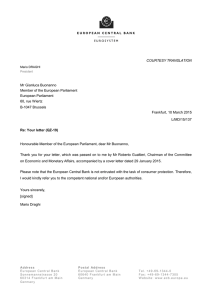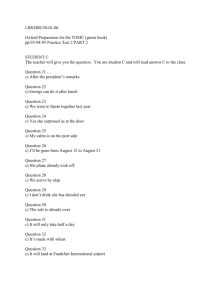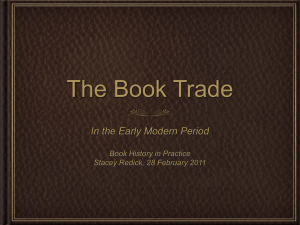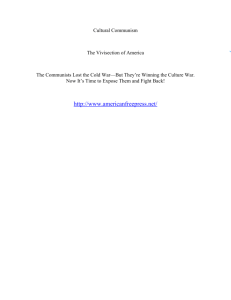Critical Theory Frankfurt School
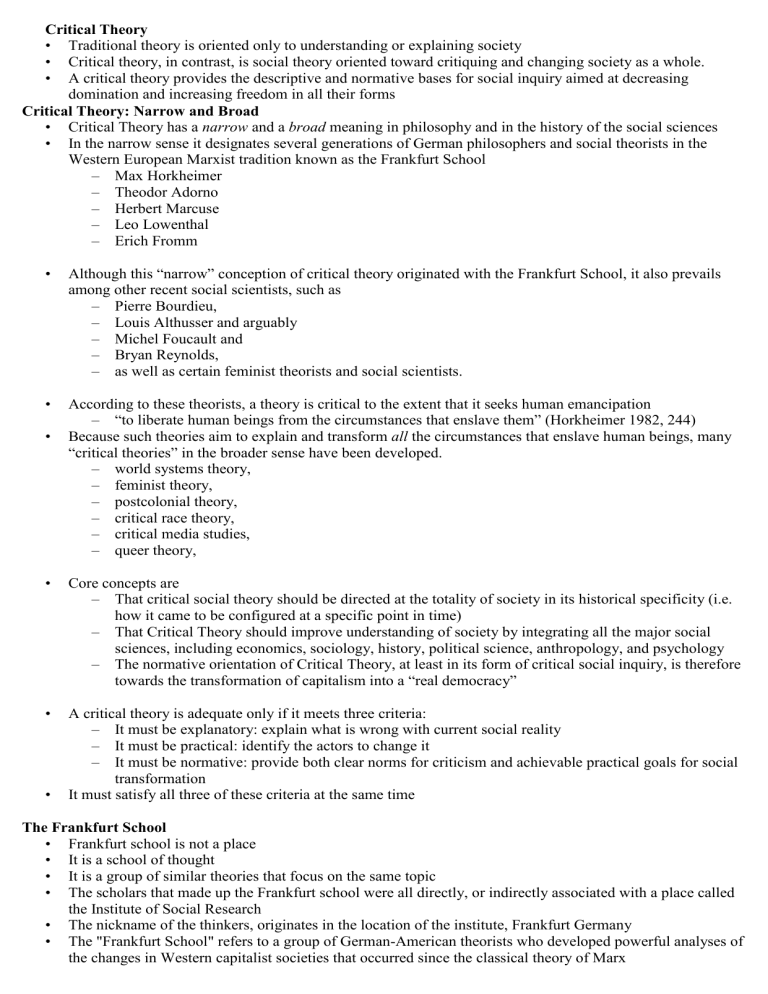
Critical Theory
• Traditional theory is oriented only to understanding or explaining society
•
Critical theory, in contrast, is social theory oriented toward critiquing and changing society as a whole.
•
A critical theory provides the descriptive and normative bases for social inquiry aimed at decreasing domination and increasing freedom in all their forms
Critical Theory: Narrow and Broad
•
Critical Theory has a narrow and a broad meaning in philosophy and in the history of the social sciences
•
In the narrow sense it designates several generations of German philosophers and social theorists in the
Western European Marxist tradition known as the Frankfurt School
–
Max Horkheimer
–
Theodor Adorno
– Herbert Marcuse
–
Leo Lowenthal
–
Erich Fromm
• Although this “narrow” conception of critical theory originated with the Frankfurt School, it also prevails among other recent social scientists, such as
–
Pierre Bourdieu,
– Louis Althusser and arguably
–
Michel Foucault and
–
Bryan Reynolds,
– as well as certain feminist theorists and social scientists.
•
According to these theorists, a theory is critical to the extent that it seeks human emancipation
– “to liberate human beings from the circumstances that enslave them” (Horkheimer 1982, 244)
• Because such theories aim to explain and transform all the circumstances that enslave human beings, many
“critical theories” in the broader sense have been developed.
– world systems theory,
– feminist theory,
– postcolonial theory,
– critical race theory,
– critical media studies,
– queer theory,
• Core concepts are
–
That critical social theory should be directed at the totality of society in its historical specificity (i.e. how it came to be configured at a specific point in time)
–
That Critical Theory should improve understanding of society by integrating all the major social sciences, including economics, sociology, history, political science, anthropology, and psychology
–
The normative orientation of Critical Theory, at least in its form of critical social inquiry, is therefore towards the transformation of capitalism into a “real democracy”
•
A critical theory is adequate only if it meets three criteria:
–
It must be explanatory: explain what is wrong with current social reality
– It must be practical: identify the actors to change it
–
It must be normative: provide both clear norms for criticism and achievable practical goals for social transformation
•
It must satisfy all three of these criteria at the same time
The Frankfurt School
•
Frankfurt school is not a place
• It is a school of thought
•
It is a group of similar theories that focus on the same topic
•
The scholars that made up the Frankfurt school were all directly, or indirectly associated with a place called the Institute of Social Research
•
The nickname of the thinkers, originates in the location of the institute, Frankfurt Germany
•
The "Frankfurt School" refers to a group of German-American theorists who developed powerful analyses of the changes in Western capitalist societies that occurred since the classical theory of Marx
• Prominent theorists within this school of thought are: Max Horkheimer, T.W. Adorno, Herbert Marcuse, Leo
Lowenthal, and Erich Fromm
• Each of these philosophers believed, and shared Karl Marx’s theory of Historical Materialism
•
Each member of the Frankfurt school adjusted Marxism with his additions, or "fix“.
• Then, they used the "fixed" Marxist theory as a measure modern society needed to meet
•
These ideas came to be known as "Critical Theory"
Note: Remember Marxist Theory
• Developed by Karl Marx in 1880s.
•
Argues that hierarchical class system is at the root of all social problems and must be ended by a revolution of the workers.
• Dominant classes directly control the means of production (labor, factories and land), which is called the base of society.
•
Rulling classes also control the culture, which is called the superstructure of society. Therefore, the dominant ideology of a society is the ideology of rulling class.
• Base: the means of production
• Superstructure: a society’s culture
•
Ideology: ideas present in a culture that mislead average people and encourage them to act against their own interests
The Neo-Marxist Approach: Frankfurt School
•
The Marxist approach to the media studies developed in parallel with the functionalist approach. It is best characterized by the work of the Frankfurt School founded in 1923.
•
The school was concerned with developing a revolutionary, philosophical variant of Western Marxism, opposed to capitalism in the west and Stalinism in the East, which came to be called critical theory.
•
In 1930s when Hitler came to power, the Institute was forced to leave Germany for New York.
• In 1953 it was re-established in Frankfurt.
•
Adorno and Horkheimer developed a Marxist sociological approach to media studies. They saw the media as a cultural industry that maintained power relations and served to lessen the ‘resistance standards’ of cultural aesthetics by popularizing certain types of culture.
• They produced some of the first accounts within critical social theory of the importance of mass culture and communication in social reproduction and domination.
•
They generated one of the first ,modes of a critical cultural studies that analyzes the processes of cultural production and political economy, the politics of cultural texts, and audience reception and use of cultural artifacts (Kellner 1989 and 1995)
•
Frankfurt school developed a critical and transdisciplinary approach to cultural and communications studies, combining political economy, textual analysis, and analysis of social and ideological effects
The contribution of the Frankfurt School
•
Frankfurt school made historical materialism a centerpiece in social theory
• It forced Marxist ideology to broaden its scope
• While Marx said, "This is historical materialism, and this is what it does”
•
The Frankfurt School said, "This is historical materialism; this is what’s right with it, this is what’s wrong with it, and this is how it works”
• The Frankfurt school also had it’s own effects on philosophy as a whole
•
It affected philosophy by preserving the notion of meta-analysis of society through its economic, political, and social systems
•
It introduced the notion of social philosophy and made theory part of everyday practice by "mixing" philosophical problems, and empirical problems
Culture Industries
• Two of Frankfurt School’s key theorists Max Horkheimer and T.W. Adorno developed an account of the
"culture industry" to call attention to the industrialization and commercialization of culture under capitalist relations of production
•
They coined the term "culture industry" to signify the process of the industrialization of mass-produced culture and the commercial imperatives that drove the system
• They analyzed all mass-mediated cultural artifacts within the context of industrial production
•
They argued the commodities of the culture industries exhibited the same features as other products of mass production:
– commodification,
– standardization, and
– massification
•
The culture industries had the specific function, however, of providing ideological legitimation of the existing capitalist societies and of integrating individuals into its way of life
The Culture Industry:
"The whole world is made to pass through the filter of the culture industry.“ (--Theodor Adorno and Max
Horkheimer from Dialectic of Enlightenment (1944)
•
Moving through nearly all aspects of the popular culture of their time--movies, radio, music--they argue that the logic of modern capitalism deskills labor and concurrently dumbs down culture. The result is a world in which a mass public has trouble distinguishing between the real world and the illusory world created by the industry of culture.
• The values perpetuated by the media were contradictory to the values of the radical Enlightenment tradition.
The masses are ‘dumbed’ by the banality of the media. Their ability to function efficiently as citizens in a democratic state is replaced by their ceaseless consumption of culture or products, or both.
•
Though the functionalist and Marxist approaches are radically different in their underlying assumptions, they are similar in that they both presume audiences to be passive and powerless.
•
They critique society as being in a state of false consciousness, a consciousness which hides the reality of domination and oppression of the masses under capitalism. The role of the media in this framework is to offer to consumers propaganda which lulls them into accepting their conditions.
•
In their theories of the culture industries and critiques of mass culture, Adorno and Horkheimer were among the first social theorists to note its importance in the reproduction of contemporary societies
•
In their view, mass culture and communications stand in the center of leisure activity, are important agents of socialization, mediators of political reality, and should thus be seen as major institutions of contemporary societies with a variety of economic, political, cultural and social effects
•
Furthermore, the critical theorists investigated the cultural industries in a political context as a form of the integration of the working class into capitalist societies
• The Frankfurt school theorists were among the first neo-Marxian groups to examine the effects of mass culture and the rise of the consumer society on the working classes
•
They argued that the system of cultural production dominated by film, radio broadcasting, newspapers, and magazines, was controlled by advertising and commercial imperatives, and served to create subservience to the system of consumer capitalism
•
Later, critics pronounced their approach too manipulative, reductive, and elitist.
• However, it still provides an important corrective to more populist approaches to media culture that downplay the way the media industries exert power over audiences and help produce thought and behavior that conforms to the existing society
•
The culture industry thesis described both the production of massified cultural products and homogenized subjectivities
•
Mass culture for the Frankfurt School produced desires, dreams, hopes, fears, and longings, as well as unending desire for consumer products
•
The culture industry produced cultural consumers who would consume its products and conform to the dictates and the behaviors of the existing society
•
Frankfurt school work was an articulation of a theory of the stage of state and monopoly capitalism that became dominant during the 1930s
• This was an era of large organizations
•
The state and giant corporations manage the economy and individuals submit to state and corporate control
•
This period is often described as "Fordism" to designate the system of mass production and the homogenizing regime of capital which wanted to produce mass desires, tastes, and behavior
• Fordism was an era of mass production and consumption characterized by uniformity and homogeneity of needs, thought, and behavior producing a mass society
•
Frankfurt school described it as "the end of the individual"
•
No longer was individual thought and action the motor of social and cultural progress
• Instead giant organizations and institutions overpowered individuals
•
During this period, mass culture and communication were instrumental in generating the modes of thought and behavior appropriate to a highly organized and massified social order
•
Thus, the Frankfurt school theory of the culture industry articulates a major historical shift to an era in which mass consumption and culture was indispensable to producing a consumer society based on homogeneous needs and desires for mass-produced products and a mass society based on social organization and homogeneity
•
The culture industry fuses the old and familiar into a new quality
• The culture industry is not like mass culture which arises spontaneously from the masses themselves
•
The products are tailored for consumption by masses
•
These products and the nature of consumption are manufactured more or less according to plan

